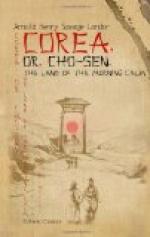He quickly turned round to escape, when a violent push knocked him down, and he fell almost senseless and bleeding all over.
“Bang!” went the rifle outside just as the screams of: “Master, aahi, aahi, kill, kill, kill,” were echoing in the drain; and the leopard with a broken hind leg rolled over on the ground groaning fiercely, by-and-by trying to retrace its steps to its domicile. The poor Corean lay perplexed, looking at the scene, all lighted up by the beautiful moonlight; and his heart bounded with joy, when, after the second or third report of the gun, he saw shot dead the animal that had already reached the opening of the drain.
As his master appeared, rifle in hand, and touched the dead beast, his valiant qualities returned to him in full, and he got out of the drain. He was badly scratched all over, I dare say, by the paws of the beast, for it had sprung violently out the moment the bamboo tickled it, though otherwise he was not much the worse for his narrow escape.
Such is the last story connected with that drain. The grounds, as you see, extend towards the west as far as the city wall. As we go out of the gate which we entered, you can see a sort of a portico on the left-hand side as you approach it. Well, under that, as the spring is approaching, there are often to be heard the most diabolical noises for several days in succession. If the season has been a very dry one, you will see several men and numberless children beating on three or four huge drums and calling out at the top of their voices for rain. From sunrise until sunset this goes on, unless some stranded cloud happens to appear on the horizon, when the credit of such a phenomenon is awarded to their diabolical howls, and cash subtracted from landed proprietors as a reward for their having called the attention of the weather-clerk. A spectacled wise-man, a kind of astrologer, on a donkey and followed and preceded by believers in his extraordinary powers of converting fine weather into wet, and vice versa, rides through the main streets of the capital, with lanterns and festoons, on the same principle as does our Salvation Army, namely, to collect a crowd to the spot where his mysterious rites are to be performed. Here, supported by his servants, he dismounts from his high saddle, and, still supported under his arms—the idea being that so great a personage cannot walk by himself—he at last reaches the spot, apparently with great fatigue. “To carry all his knowledge,” argue the admiring natives, “must indeed entail great fatigue.”
When rain is to be summoned, our astrologer addresses his first reproaches to the sun, stretching out his hands and using the strongest of invectives, after which, when he has worked himself into a towering rage against the orb of day, an execrable beating on the drums begins, accompanied by the howling of all the people present. The god of rain gets his share of insults, and is severely reprimanded for the casual way in which he carries on his business, and so, partly with good, partly with bad manners, this satanic performance goes on day after day, until, eventually, it does begin to rain.




